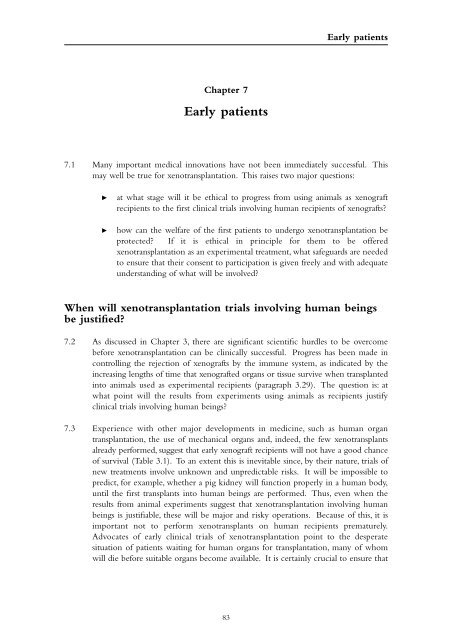Xenotransplantation - Nuffield Council on Bioethics
Xenotransplantation - Nuffield Council on Bioethics
Xenotransplantation - Nuffield Council on Bioethics
You also want an ePaper? Increase the reach of your titles
YUMPU automatically turns print PDFs into web optimized ePapers that Google loves.
Early patients<br />
Chapter 7<br />
Early patients<br />
7.1 Many important medical innovati<strong>on</strong>s have not been immediately successful. This<br />
may well be true for xenotransplantati<strong>on</strong>. This raises two major questi<strong>on</strong>s:<br />
<br />
<br />
at what stage will it be ethical to progress from using animals as xenograft<br />
recipients to the first clinical trials involving human recipients of xenografts?<br />
how can the welfare of the first patients to undergo xenotransplantati<strong>on</strong> be<br />
protected? If it is ethical in principle for them to be offered<br />
xenotransplantati<strong>on</strong> as an experimental treatment, what safeguards are needed<br />
to ensure that their c<strong>on</strong>sent to participati<strong>on</strong> is given freely and with adequate<br />
understanding of what will be involved?<br />
When will xenotransplantati<strong>on</strong> trials involving human beings<br />
be justified?<br />
7.2 As discussed in Chapter 3, there are significant scientific hurdles to be overcome<br />
before xenotransplantati<strong>on</strong> can be clinically successful. Progress has been made in<br />
c<strong>on</strong>trolling the rejecti<strong>on</strong> of xenografts by the immune system, as indicated by the<br />
increasing lengths of time that xenografted organs or tissue survive when transplanted<br />
into animals used as experimental recipients (paragraph 3.29). The questi<strong>on</strong> is: at<br />
what point will the results from experiments using animals as recipients justify<br />
clinical trials involving human beings?<br />
7.3 Experience with other major developments in medicine, such as human organ<br />
transplantati<strong>on</strong>, the use of mechanical organs and, indeed, the few xenotransplants<br />
already performed, suggest that early xenograft recipients will not have a good chance<br />
of survival (Table 3.1). To an extent this is inevitable since, by their nature, trials of<br />
new treatments involve unknown and unpredictable risks. It will be impossible to<br />
predict, for example, whether a pig kidney will functi<strong>on</strong> properly in a human body,<br />
until the first transplants into human beings are performed. Thus, even when the<br />
results from animal experiments suggest that xenotransplantati<strong>on</strong> involving human<br />
beings is justifiable, these will be major and risky operati<strong>on</strong>s. Because of this, it is<br />
important not to perform xenotransplants <strong>on</strong> human recipients prematurely.<br />
Advocates of early clinical trials of xenotransplantati<strong>on</strong> point to the desperate<br />
situati<strong>on</strong> of patients waiting for human organs for transplantati<strong>on</strong>, many of whom<br />
will die before suitable organs become available. It is certainly crucial to ensure that<br />
83
















